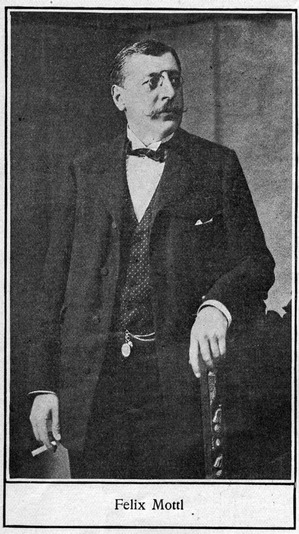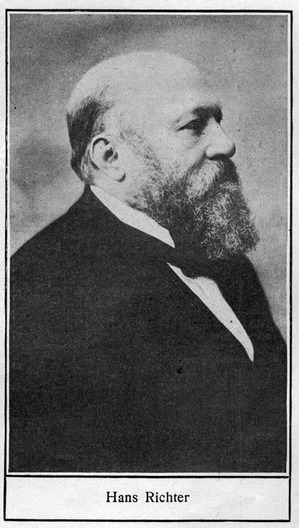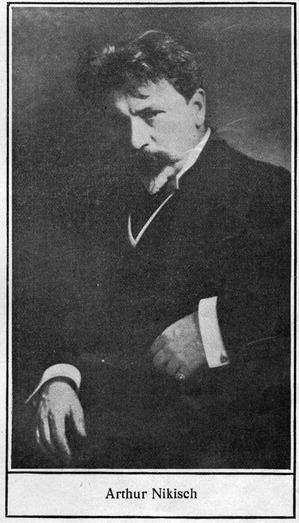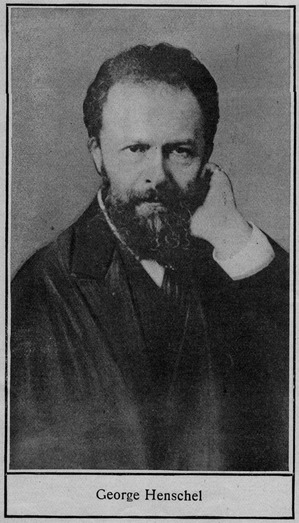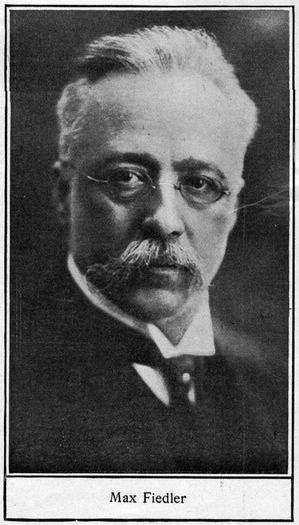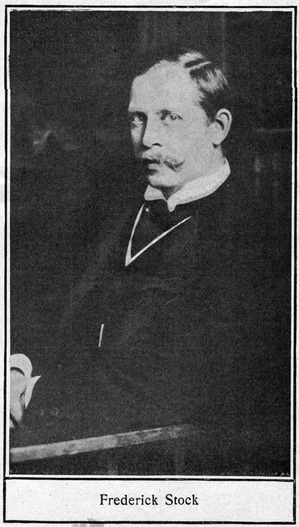Mottl was born at Unter-St. Veit, near Vienna, August 29, 1856, and died July 2, 1911, at Munich. As a boy he possessed a fine soprano voice and obtained admission to the preparatory school of the Imperial Court Chapel. His musical education was completed at the Vienna conservatory under Josef Hellmesberger, and he was eventually awarded all the prizes the institution could bestow. He first attracted attention as a conductor at the concerts of the Academical Richard Wagner Verein of Vienna. In 1876 Mottl was stage conductor of Wagner’s Ring at the Bayreuth Festival. He became conductor of the Grand Ducal Opera House in Carlsruhe in 1881, and remained there until 1903. While in Carlsruhe he produced many important stage works, including the complete cycle of operas by Berlioz. He also conducted the Carlsruhe Philharmonic until 1892, and in 1886 was appointed by the Bayreuth authorities to conduct the festival performances of Tristan und Isolde. He came to New York in 1903-04 to conduct Parsifal upon its American production. Mottl left three operas, a string quartet, and many songs, besides editing various works of Berlioz, Cornelius, Liszt, etc. Mottl was one of the greatest of the Wagnerian conductors, but was far too catholic in his tastes and broad-minded in his outlook to rely upon that alone for his great reputation.
(Richh’-ter.)
Richter was born in Raab, Hungary, April 4, 1843. He became a boy member of the Court Chapel choir in Vienna in 1853, and remained there for four years. As a student of the Vienna conservatory in 1860 he became a pupil of Kleinecke (horn), Heissler (violin) and Sechter (theory). In 1866 he lived in Lucerne with Wagner, to whom he acted as copyist. The next year he was in Munich as conductor at the Hofund National Theater, enjoying the friendship of Bulow, then returned to Wagner at Lucerne, and made a fair copy for the engraver of Wagner’s Ring. Richter was appointed chief conductor of the National Theater at Pesth in 1871, and four years later conducted an orchestral concert in Vienna, which led to his appointment as director of the Philharmonic concerts in Vienna. He was director of the rehearsals and performances of the Bayreuth Festival in 1876, and was loaded with honors, and also appointed court capellmeister at Vienna (1878). In 1877 he started the Wagner concerts in London, which subsequently were known as the “Richter concerts.” In 1897 he was appointed director of the Manchester orchestra, and since 1885 has been director of the Birmingham festivals. The conducting of the opera at Covent Garden has been in the hands of Richter since 1904 until the present year. Increasing years have forced Dr. Richter to give up his public career, but his work has been lavishly appreciated by the English.
(Neek’ish.)
Nikisch was born at Lebenyi Szent Miklos in Hungary, October 12, 1855. In early childhood he showed great musical aptitude, and commenced his studies of the piano and composition at the age of six. At eleven he became a pupil of Hellmesberger, Schemier and Dessoff at the Vienna conservatory. He greatly distinguished himself at the conservatory, which he left in 1873. The violin was for a time his chief study, and he gained orchestral experience with this instrument. In 1878 he had an opportunity to go to Leipsic as “Chorrepetitor” at the opera, and commenced his career as a conductor. In 1879 he became first conductor at the opera upon Sucher’s retirement, and for the next ten years he occupied himself in reviving neglected masterpieces and the best new operas. In 1888 he electrified everybody by directing a Liszt concert at the opera, at which he conducted the Faust and Dante symphonies from memory; Liszt was forbidden fruit in those days! Conservative Leipsic was much relieved when Nikisch came to America in 1889 to do great work as conductor of the Boston Symphony. He returned to Europe in 1893 and became Hofkapellmeister at the Buda-Pesth opera. During a London engagement, however, he received an invitation to become conductor at the Leipsic Gewandhaus on the retirement of Reinecke in 1895. In this post he now occupies a commanding position in European musical affairs.
Henschel was born at Breslau, February 18, 1850, and showed great aptitude for music early in life. He sang in public as a boy and as a young man, and in 1867 entered Leipsic Conservatory under Moscheles for piano, Reinecke and Richter for theory, Goetz for singing and Papperitz for organ. He also studied in Berlin with Kiel and Adolphe Schultze. He appeared in festivals in Germany and soon won a prominent position. He first appeared in London in 1877 and soon established a great reputation as a singer with his beautiful voice and his wonderful artistic intelligence. While in London he met Lillian Bailey, an American singer, and in 1881 they were married. The same year he was appointed conductor of the Boston Symphony, which was founded at that time. Subsequently Mr. and Mrs. Henschel frequently gave song recitals together, and established themselves as great favorites in America, though for the most part they lived in England. Henschel founded the London Symphony concerts in 1886 and produced many important works and at the same time was engaged in teaching singing at the Royal College of Music. His compositions include choral and orchestral works, pianoforte pieces and many songs, such as Spring, Morning Song and the Gondoliera. Since the death of his wife he has retired from public work, in which he has been successful as a singer, teacher, composer, conductor, and indeed in practically everything he has undertaken.
(Feed’-ler.)
Fiedler was born at Zittau, December 31, 1859. His musical ability manifested itself at an early age, and after studying with his father he made his initial public appearance at the age of ten. His remarkable ability enabled him to win a scholarship by means of which he studied at Leipsic Conservatory under Reinecke, Paul and Jadassohn. He graduated in 1880. He had planned to be a concert pianist, but unfortunately too much practice resulted in injury to his arm, and he was obliged to take a long rest. Two years after leaving Leipsic he was appointed professor of advanced piano playing at Hamburg Conservatory, and in this position he built up a solid reputation which has placed him in the front rank of contemporary musicians. In 1894 he became head of the conservatory, and in 1904 was appointed conductor of the Philharmonic orchestra. He has been “guest” conductor in all the principal European cities, Rome, London, Berlin, Dresden, Paris, St. Petersburg, etc., and is an especial favorite in Russia. Fiedler’s first American appearance took place in 1904, when he conducted the New York Philharmonic with conspicuous success. In 1908 he was appointed conductor of the Boston Symphony orchestra, and has become well known in American musical life. His compositions include a symphony, choral works, pianoforte works, songs and chamber music. He is very catholic in his tastes and always willing to give young composers a chance.
Stock was born at Julich, Germany, November 11, 1872. His father was a bandmaster in the German army, and gave him his first music lessons. He became a student at Cologne conservatory in 1886 and graduated as a violinist. He became a member of the Municipal orchestra, but was not satisfied to settle down into routine work, and to avoid this studied composition with Humperdinck, Zollner and Franz Wüllner. He joined the Chicago orchestra in 1895, and four years later became assistant conductor to Theodore Thomas. From 1903 to 1905 Stock conducted all the orchestra engagements outside of Chicago, and upon the death of Thomas became conductor in chief. His compositions include a symphonic poem, overtures, symphonic variations on an original theme, etc. He has also written chamber music, one of his quartets being in the repertoire of the Kneisel Quartet. Probably no orchestral conductor is better known in America than Frederick Stock, as the work of the Thomas Orchestra has by no means been confined to Chicago. At many of the great musical festivals in the South and in the Middle West the orchestra is engaged as a matter of course, and in this way is probably better known than most of the great orchestras of the country. Mr. Stock is a careful, accurate conductor, and keeps his orchestra under perfect control. Unlike many European-born musicians, he understands the needs of the American people to a remarkable degree that one hardly thinks of him as of German birth.


